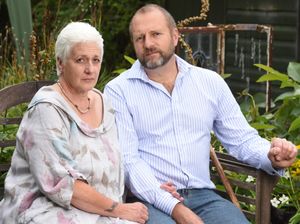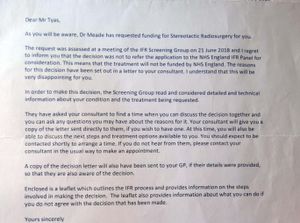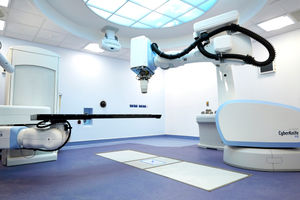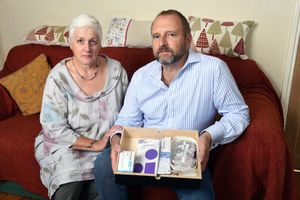'The NHS has given me a death sentence': Father denied potentially life-saving treatment
A spinal tumour patient claims health bosses have given him a death sentence after he was denied access to a life-saving machine paid for by the public.

Instead, father-of-two Gary Tyas, who has fought cancer for 15 years, has been offered an alternative type of therapy by the NHS – but which is £10,000 more expensive than the treatment he requested.
The 55-year-old has endured numerous operations and rounds of radiotherapy which have left him with epilepsy and memory loss.
But his request to receive surgery from a potentially life-saving ‘CyberKnife’ machine on his choroid plexus carcinoma, a rare type of brain and spinal cancer usually found among children, has been turned down by NHS England.

The CyberKnife at Birmingham’s Queen Elizabeth Hospital, which cost £3.5 million, was funded by public donations and is available for use by NHS and private patients. It is capable of giving sufferers ‘a second chance at life’ by targeting cells with x-rays.
Instead Gary, from Kidderminster, claims he has been offered tomotherapy on palliative grounds despite the fact it will cost the NHS £26,860 – £10,000 more than the £16,348 cost of the CyberKnife treatment – and his doctors have said that it would be ineffective.
The family were left furious when the ‘death sentence’ letter bringing the news Gary’s request for the life-saving treatment had been denied was sent in an envelope with a second class stamp.

Queen Elizabeth Hospital said a funding request for Gary’s CyberKnife surgery – required when a treatment is not routinely funded on the NHS – was declined by NHS England’s Individual Funding Request Screening Group.
Gary, a former head of grounds and gardens at the University of Birmingham, said: “I feel like my life is being held to ransom by a group of pen pushers.
“I feel like I’ve been treated like a cheap piece of meat. It’s like I’ve been given a death sentence. I spend my life waiting for the postman to bring me a letter about when my next scan will be, to see what the condition of the tumour is.
“My next scan is the day after my son’s wedding in September, but after this all we can do is hope.
“I hope nobody else ever has to go through what we’ve had to go through.”

Gary’s wife Claire, 56, added: “After all the battles we’ve gone through, to have this turned down is just appalling.
“To be told that they had just handed down a death sentence to my husband in a penny-pinching, second class franked brown envelope really hurt.
"The callous nature of a photocopied information leaflet and a scanned signature just disgusts us. I lost my mother to a brain tumour, I don’t want my sons to have to face the same.
“Gary feels like he’s being thrown on the scrapheap and that he’s being left to die. He has suffered enough.”

Gary was first diagnosed with a brain tumour in August 2003 aged 40 and although the mass was successfully removed, he was left with a range of devastating side effects including memory loss and had to relearn how to walk and read.
In 2008 these symptoms meant he was forced to give up his job, before a tumour on his spine was later found by doctors on Christmas Eve 2015.
And despite more initially successful surgery in February this year, in April Gary’s family were given the news the tumour in his spine had regrown.
A statement from University Hospitals Birmingham NHS Foundation Trust, which runs the Queen Elizabeth Hospital, said: “The trust submitted an Individual Funding Request for use of Cyberknife following consideration by a multi-disciplinary team.
“The request was declined, as was a subsequent appeal.”
NHS England said: “These are difficult and complex decisions. If a treatment is not routinely provided, a patient’s clinician can submit an Individual Funding Request, which is considered on a case by case basis.”





